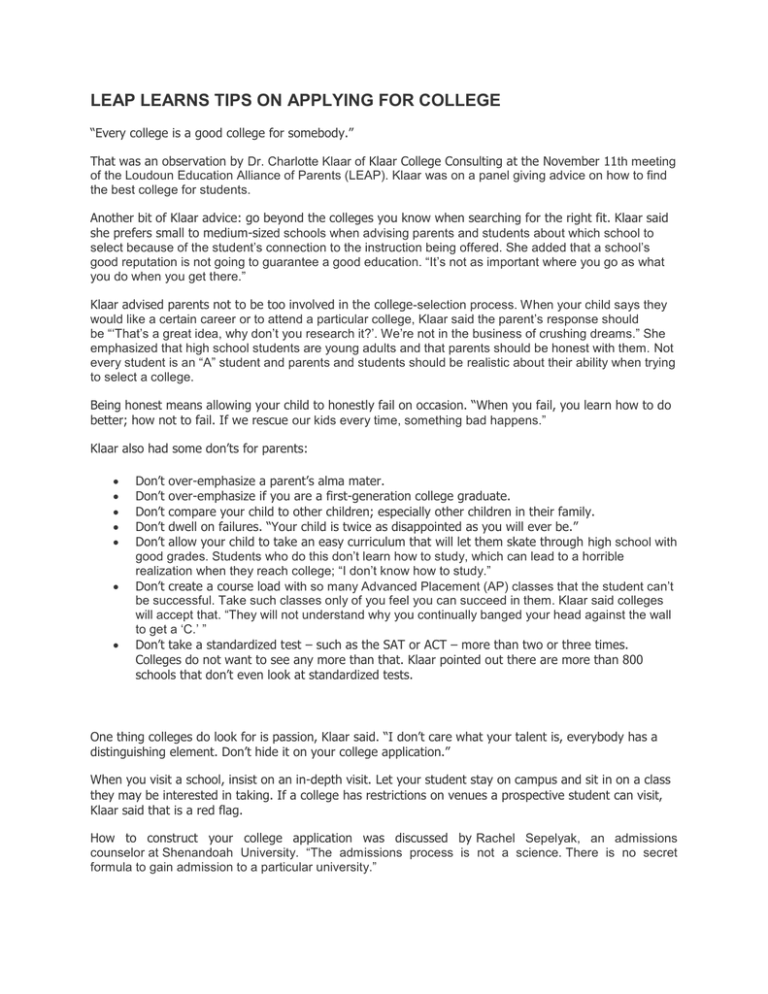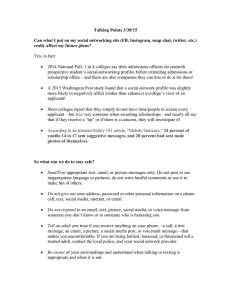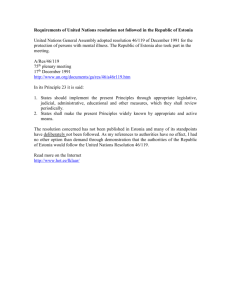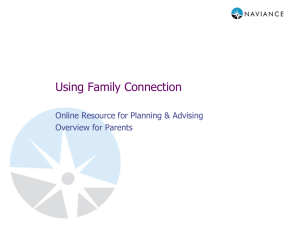LEAP LEARNS TIPS ON APPLYING FOR COLLEGE
advertisement

LEAP LEARNS TIPS ON APPLYING FOR COLLEGE “Every college is a good college for somebody.” That was an observation by Dr. Charlotte Klaar of Klaar College Consulting at the November 11th meeting of the Loudoun Education Alliance of Parents (LEAP). Klaar was on a panel giving advice on how to find the best college for students. Another bit of Klaar advice: go beyond the colleges you know when searching for the right fit. Klaar said she prefers small to medium-sized schools when advising parents and students about which school to select because of the student’s connection to the instruction being offered. She added that a school’s good reputation is not going to guarantee a good education. “It’s not as important where you go as what you do when you get there.” Klaar advised parents not to be too involved in the college-selection process. When your child says they would like a certain career or to attend a particular college, Klaar said the parent’s response should be “‘That’s a great idea, why don’t you research it?’. We’re not in the business of crushing dreams.” She emphasized that high school students are young adults and that parents should be honest with them. Not every student is an “A” student and parents and students should be realistic about their ability when trying to select a college. Being honest means allowing your child to honestly fail on occasion. “When you fail, you learn how to do better; how not to fail. If we rescue our kids every time, something bad happens.” Klaar also had some don’ts for parents: Don’t over-emphasize a parent’s alma mater. Don’t over-emphasize if you are a first-generation college graduate. Don’t compare your child to other children; especially other children in their family. Don’t dwell on failures. “Your child is twice as disappointed as you will ever be.” Don’t allow your child to take an easy curriculum that will let them skate through high school with good grades. Students who do this don’t learn how to study, which can lead to a horrible realization when they reach college; “I don’t know how to study.” Don’t create a course load with so many Advanced Placement (AP) classes that the student can’t be successful. Take such classes only of you feel you can succeed in them. Klaar said colleges will accept that. “They will not understand why you continually banged your head against the wall to get a ‘C.’ ” Don’t take a standardized test – such as the SAT or ACT – more than two or three times. Colleges do not want to see any more than that. Klaar pointed out there are more than 800 schools that don’t even look at standardized tests. One thing colleges do look for is passion, Klaar said. “I don’t care what your talent is, everybody has a distinguishing element. Don’t hide it on your college application.” When you visit a school, insist on an in-depth visit. Let your student stay on campus and sit in on a class they may be interested in taking. If a college has restrictions on venues a prospective student can visit, Klaar said that is a red flag. How to construct your college application was discussed by Rachel Sepelyak, an admissions counselor at Shenandoah University. “The admissions process is not a science. There is no secret formula to gain admission to a particular university.” While there’s no secret, Sepelyak said there are some mistakes prospective students can avoid when constructing their applications. First, know what the college requires as basic admissions standards. Do you need two or four years of a foreign language? Can you take more than one language to meet this requirement or do all the years have to be in a single language? How many years of math are required? Does a student have to take math up to a certain level? Are AP or International Baccalaureate (IB) classes necessary for admission? Know the different application deadlines. Rolling admissions are done by colleges and universities that accept applications year-round. Applicants usually know within weeks of finishing an application if they have been accepted. Early decision applications are binding if the applicant is accepted. Sepelyak warns students not to apply for more than one early decision. Early action applications are not binding. Applicants will receive admission notification in January or February. Regular decision applicants will receive their decision around March. When writing an application essay, Sepelyak advised students to answer the questions they are being asked. Don’t write two pages if the college is only looking for one. Proof read your essay carefully. Sepelyak read one essay that finished with the applicant saying they looked forward to becoming a Hokie (Shenandoah is the Hornets). Don’t send too many letters of recommendation; one to three is plenty. Admissions officers have a short time to consider applications and too many letters are bad. Cathy Hall, the high school outreach coordinator for Northern Virginia Community College (NOVA), told why considering a two-year college could be a good option. First, she noted that NOVA is the largest post-secondary institution in Virginia and second-largest in the nation (trailing only Miami/Dade Community College). Despite its size, NOVA offers small class sizes with an average class size of 25 (its largest class is 50). Hall added that honors classes are never bigger than 18 students and average about eight or nine. She also noted all classes are taught by faculty members and that students are able to have a relationship with their professor, which isn’t always the case at larger institutions. Every student at NOVA has a support team, said Hall, which will help them select courses that are not too easy or too challenging. Applications can be done online in 20 minutes and the college accepts applications from anyone with a high school diploma. NOVA’s scheduling is very flexible; campus is open for classes from 6:30 a.m. until 9:45 p.m. Hall noted that NOVA has guaranteed admissions agreements with many top colleges and universities. This means if the NOVA student meets the four-year college’s criteria for admission – such as maintaining a certain grade point average (GPA) – they will be automatically admitted. Hall said studies show that a higher percentage of people graduated from a four-year college after transferring from a two-year school than graduate when they start the four-year school as a freshman. Price is, of course, a major factor in choosing a community college. A two-year degree costs $10,000. The J. Michael Lunsford Middle School College Readiness Team, including Principal Carrie Simms; Jennifer Calderone, seventh grade counselor; and Sue Simpson, counselor of programs and career readiness, told LEAP delegates how to prepare younger students for college. “For us, it’s about exploration and exposure,” said Simms. For most middle school students, college is something they have heard about, but not seen. Through the College in Six program, Loudoun middle schools take students to college campuses. Typical questions on these excursions include “What time is lunch?” and “Where are the lockers?” Simms said this points out one of the flaws that doom many college careers; the inability to live independently. That’s where family and consumer science(FACS) courses come into play. Students are taught basic life skills such as cooking, doing the laundry and personal finance. Since GPA doesn’t yet count (with the exception of high-school-credit courses), students can try a subject without the fear of a damaging grade hanging over them. By eighth grade, Simms said students do a college search using Family Connections. Family Connections (known as Naviance at the high school level) allows students to do college searches and career assessments using interests, grades and standardized test scores. More than 3,500 colleges and universities have detailed information that can be viewed through this system. This service is free and students can use it to track their college searches as well as how other students from their school fared when applying to a specific college. The counselors again urged honesty when using tools such as Family Connections and Naviance. “It’s just as important to know what you don’t like as to know what you do like.” Calderone and Simpson said students might also consider if going straight to college is right for them. Taking a gap year to examine options or pursuing a trade certification might be a better option. LEAP’s past president, Maura Walsh-Copeland, gave a parent perspective on applying to college (she’s been through this three times). Communication with your child about their interests is a key. “If you pay attention and listen carefully, you may hear a career interest.” It's also important for parents to know what resources may help their students learn about colleges and career interests. In additional to Naviance, the College Board website is also a useful resource. Walsh-Copeland advised parents to check their LCPS high school web sites under School Counseling to get all the forms they will need. When preparing for standardized tests, Walsh-Copeland said parents need to ask themselves a question about their students: “Do they need confidence or content.” Prep courses and tutors may be the order of the day or a book with mock tests and strategies might do the trick. Parents should try to stay at step ahead and do their "homework" to know what options will work best for their students. Like other speakers, Walsh-Copeland emphasized that students must take ownership of the college application process. Knowing where college information could be found helped her point her children in the right direction, but she made them keep track of their application requirements and deadlines. Parents also should help proofread applications and be supportive during the waiting game. And, if parents pay attention, do their homework and find their best resource tools, they'll be rewarded with their student's graduations and maybe even a, "thank you."



